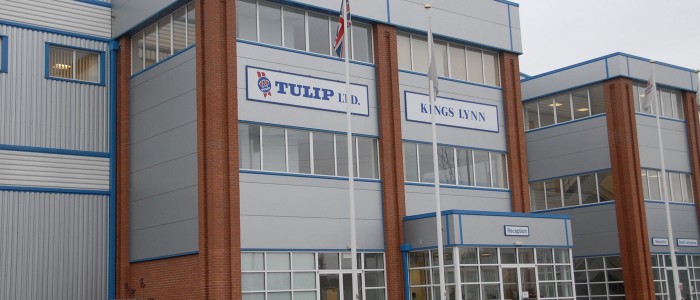Tulip recorded further heavy losses in 2017/18 and is ‘dragging down’ parent company Danish Crown’s results, prompting an ongoing cost-cutting exercise at the UK pork processor.
More than 150 jobs have been lost at the company over the past few months and further cuts to remove more than £20m in costs within the company will be implemented over the next year or so.
Danish Crown’s total profits fell by 151 million DKK to 1.361bn DKK (about £161 million) in 2018, according to the latest financial statement from the Danish meat giant. This was partly due to revenue falls on the back of declining pork and beef prices across its global companies.
But Danish Crown pinned most of the blame squarely on Tulip. While much of the Danish parent company’s business is performing well, continued losses in its UK pork processing company have forced it to postpone its strategic target by two years. “It is primarily Tulip Ltd that is dragging down the results,” Danish Crown said.
Tulip actually returned a profit on ordinary operations for the first quarter of the fiscal year, but, overall, a net operating loss of 260m DKK (£31m) has been posted for the year against a loss of 231m DKK (£27.4m) last year. Danish Crown CEO Jais Valeur said a detailed review and analysis of Tulip Ltd has revealed that it has been ‘unable to fully optimise our UK supply chain, while operating costs are far too high’.
“We have therefore launched a comprehensive cost-cutting plan, and in the past two months we had to say goodbye to more than 150 salaried employees in the UK business. Altogether, we expect to reduce costs by more than 200m DKK (£24m) from the 2018/19 financial year,” he said.
Danish Crown recently announced that Andrew Cracknell had been appointed as CEO of Tulip, replacing Danish Crown CEO Jais Valeur in the role. It said Mr Cracknell, who spent much of his career at meat giant ABP before joining Noble Foods in 2015 had been chosen to manage the on-going transformation of Tulip.
Danish Crown said it was doing ‘all it can to bolster earnings for the benefit of the group’s owners – the Danish farmers’. However, ongoing problems at Tulip are impacting Danish Crown’s earnings to such an extent that it will now take an extra two years to realise its strategic target of raising the settlement price paid to cooperative members by 0.60 DKK per kg.
“We’re definitely not happy with the financial statements,” Mr Valeur said. “We’re still badly affected by the problems in our UK business. At the same time, a combination of turbulence on the world market, generally low world market prices for pork and a strong euro has significantly undermined our profit in the past year. Contrary to expectations, we have therefore not managed to improve our overall performance but have instead gone into reverse. This is not good enough, and more than anything it is frustrating, because in most other respects our strategy is succeeding.”
Results summary
- Due to declining pork and beef prices meant Danish Crown’s revenue declined slightly to 61 billion DKK (£7.2bn) in 2017/18, despite of acquisitions in the period.
- But gross profit is up 146m DKK (£17m) at 8bn DKK (£950m) following the acquisition of DK-Foods in Denmark, Gzella in Poland and the Dutch company Baconspecialist Zandbergen.
- The profit from primary operations is reduced by 181m DKK (££21.5m) to 1,742bn DKK (£207m).
- The group has posted a total profit for the year of 1.361bn DKK (£161m). This represents a decrease of 151m DKK (£18m) on 2016/17, when adjusted for special items.
The company said that after this summer’s drought, in the last three months of the financial year it has deliberately paid higher pig and cattle prices than warranted by the market, which hit its bottom line.
Meanwhile, other processing companies have posted better results than last year. Polish company Sokołów’s earnings are up 26% and Tulip Food Company in Denmark posted growth of 29%, following a year of improved sales of bacon in Europe and growth in exports of canned meat.
In Denmark, the company has increased the supply of pigs through its abattoirs by 4% and cattle by 2%, boosting jobs numbers in Denmark by 236 and winning significantly more market share. “Our growth in Denmark is explained by our unswerving focus on quality and the Danish origin of the animals,” Mr Valeur said.
|
Key figures for Danish Crown* |
|
|
|
mDKK |
2017/18 |
2016/17 |
|
Revenue |
60,892 |
62,024 |
|
Operating profit before special items |
1.742 |
1.923 |
|
Operating profit |
1.758 |
2.449 |
|
Net profit for the year |
1.361 |
2.022 |
|
Total assets |
27,980 |
24,433 |
|
Equity |
7.540 |
7.611 |
|
Cash flow from operating activities |
1.666 |
2.530 |
|
Cash flow from investing activities |
-3.086 |
-593 |
|
Supplies from members, million kilo |
1.276 |
1.229 |
|
No. of Employees |
27,921 |
25,956 |
* Consolidated figures including Leverandørselskabet Danish Crown AmbA




